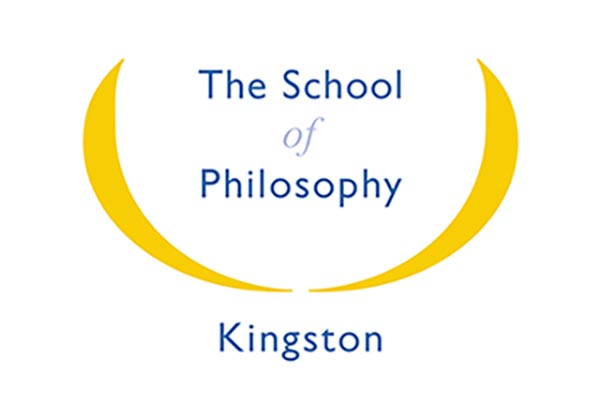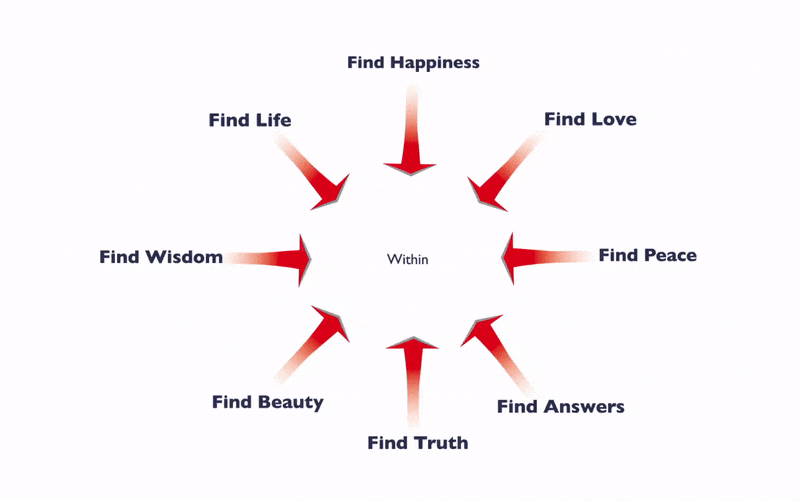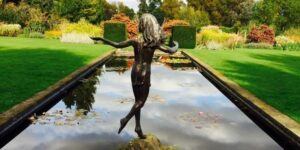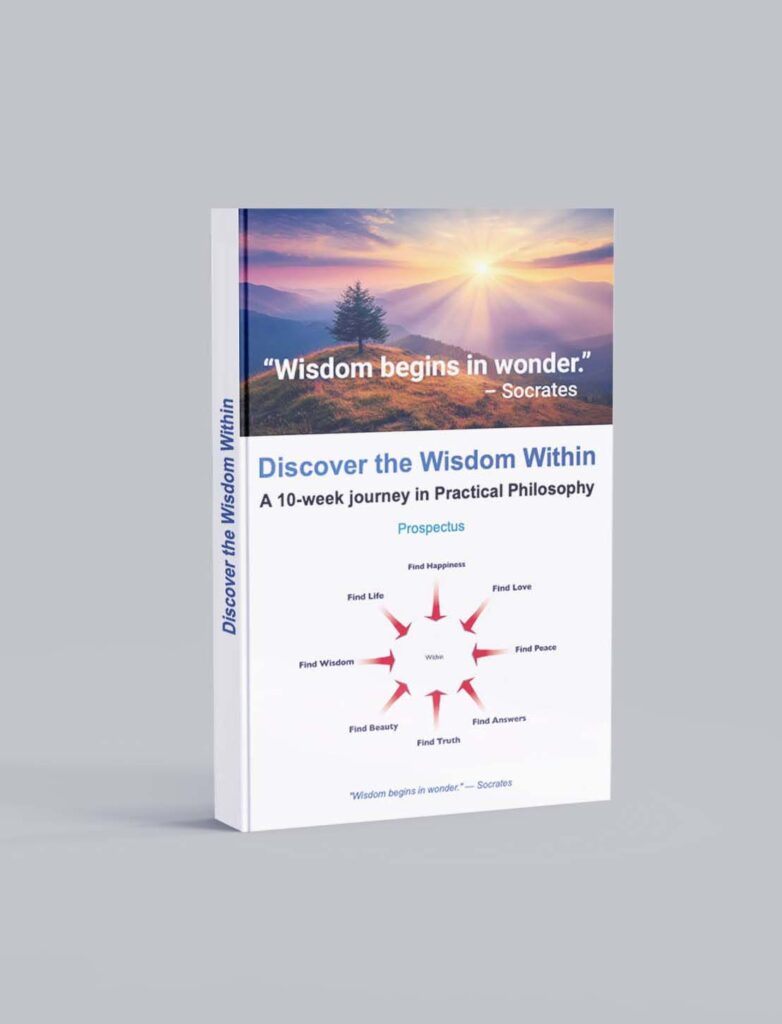All New students will receive a blue booklet which explains the structure of our course.
New students will be invited into our Introductory Group which will be studying either Wisdom, Happiness or Love and will cover all three of these Parts in the first Introductory year.
Each ‘Part’ or term stands on its own, so new students can ENROL into any of the 1st three ‘Parts’ of the course.
Introductory Course: The Introductory Group covers three topics fundamental to human life – Wisdom, Happiness and Love. Each topic is covered in your 1st three terms (Parts) which can be taken in any order and hence new students are welcomed into each of the three terms (Parts) of the Introductory course.
1. Introductory Course – Practical Philosophy & Wisdom:
- The Wisdom Within – How philosophy can help us enjoy richer, less stressful and more useful lives. We introduce a simple awareness exercise in mindfulness.
- Know Thyself – Practical ways to explore who we really are and how to tap into our true potential.
- Being Awake – The truly wise are awake, perceptive and curious. How to become more awake to ourselves, our surroundings, and the events we meet.
- The Present Moment – The power of attention either centred, captured, open or scattered, and how they relate to the past, present and future.
- Living Justly – Plato suggests justice and injustice begin within ourselves and that we must be alert to six potential ‘tyrants’ within ourselves.
- Understanding energy and using it wisely – Recognising differing qualities of energy; and how to conserve energy and use it wisely.
- The Light of Reason – Ways of accessing the power of reason.
- The Power of Beauty – in many different forms. Plato – is beauty one or many?
- Unity in Diversity – The unifying factor behind the apparent diversity.
- The Desire For Truth – not theoretically, but in our own experience. The way forward.
2. Introductory Course – Practical Philosophy & Happiness
- Tolstoy’s view of happiness. The effect of a unified view.
- Is happiness natural? Relationship of happiness and law
- Happiness and utilitarianism. The effect of listening
- Happiness and pleasure, Epicurus, Aristippus, Plato. Natural happiness.
- The Platonic divine and human goods which lead to happiness
- An introduction to Marsilio Ficino and full immersion in the present.
- Lao Tzu – finding inner equilibrium. Tea ceremony.
- Happiness: contentment, Patanjali and yoga. Meditation. Ambition.
- Finding happiness in work. A practical exercise.
- Happiness and wisdom. The wisdom of Marcus Aurelius.
3. Introductory Course – Practical Philosophy & Love
- Three forms of love, in Greek – eros, philia, agape
- The expression of love through wisdom, attachment or delusion / Thomas à Kempis – ‘love knows no measure’
- Love and constancy / Boethius – while in prison, Philosophy spoke to him
- The beloved / Great Debates in the Forest.
- Causes of conflict, hostility & duality / Ways of meeting people
- Love and gratitude / The Inner organ of mind
- The love poetry of Rumi / The book of Mirdad
- Epictetus – what you can change and what you can’t change / Phillis Wheatley
- Love and work / Work is love made visible; Khalil Gibran
- Wanting to be loved / Love and wise law
After three terms, having studied Parts 1-3 (in any order), students move on to the Presence group studying Parts 4-6 as follows:-
Presence Group (Parts 4-6)
4 – Practical Philosophy – Being Present
- Significance of being present. Learning takes place in the present
- Stillness & unity – the power of a quiet mind
- Discrimination between substance & form, transient & eternal
- The moving mind: circling thought, dream & procrastination
- Absolute existence: unlimited, infinite and complete.
- Relative existence: changing, transient and dependent.
- The power of thought – As a Man Thinketh, James Allen
- What in reality actually is present? Power of illusion
- The difference between form & substance
- The ‘Now’ & absolute existence
- Playing one’s part – connecting with the natural rhythm.
- Quality of thought. The power of decision & bases for decision making
- The Heart and the power of love
- The Ego and the power of Will. Will and reason
- Step by step in the present
- Universal powers of thought, decision, love. The self as the owner of these powers
- Mantra Meditation & tradition
5 – Practical Philosophy – Freedom
- Freedom, Truth and Love
- Freedom and the play of life, going backstage
- Freedom of speech, the four levels of speech, meditation
- Discussion, dialogue and dialectic.
- Journey to freedom, myths, the Odyssey
- Emotional freedom
- Freedom and the Heart
- Valuing freedom, Guides for living
- Freedom from tyranny, the subtle realm of mind
- Freedom and humanity, Ubuntu, Sanatan Dharma
- Freedom, True being, Meditation
6 – Freedom in Action
- Free v Bound
- Motive & action
- Attention & action
- Meditation & action (Students take up the practice of meditation)
- Love & action
- Service & action
- Flow & action
- Bhagavad Geeta & action
- Knowledge & action
- Four Principles of Action
At this point students who decide to take up the practice of meditation move on to embrace deeper realms of Non-duality. This is where Practical Philosophy and Meditation can together become deeper and most transformative if that is what you are seeking; if not then talk to us to consider our other available options which you can see under ‘All Courses & Events’.
New Meditators Group (Practical Philosophy with Meditation) Part 7 onwards:
Part 7 – Emotional Freedom: This is the first part of the ‘Philosophy with Meditation’ Programme. The method of meditation from the Advaita (Non-dual) tradition suits our active and busy lifestyles. It complements the programme of Non-dual Philosophy so the course can offer a life-enhancing growth in Knowledge and Being together in a balanced way.
From here onwards you will have the benefit of the fellowship and support of the School and its members for your study and practice of philosophy and meditation for as long as you wish.







